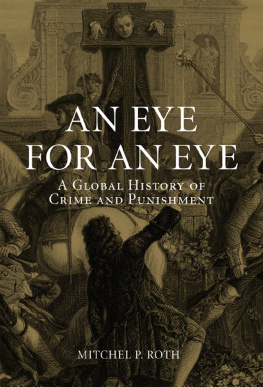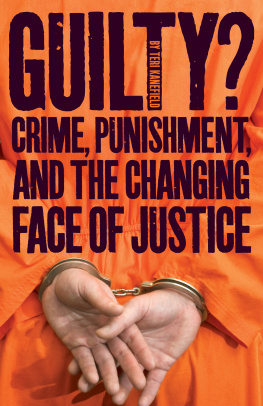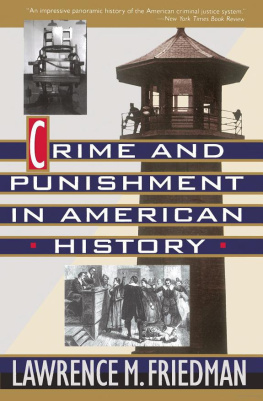First published in Great Britain in 2017 by
Policy Press University of Bristol 1-9 Old Park Hill Bristol BS2 8BB UK Tel +44 (0)117 954 5940 e-mail
North American office: Policy Press c/o The University of Chicago Press 1427 East 60th Street Chicago, IL 60637, USA t: +1 773 702 7700 f: +1 773-702-9756 e:
Policy Press 2017
British Library Cataloguing in Publication Data
A catalogue record for this book is available from the British Library
Library of Congress Cataloging-in-Publication Data
A catalog record for this book has been requested
ISBN 978-1-4473-2587-1 paperback
ISBN 978-1-4473-2586-4 hardcover
ISBN 978-1-4473-2589-5 ePub ISBN 978-1-4473-2590-1 Mobi
ISBN 978-1-4473-2588-8 ePdf
The right of Jo Turner, Paul Taylor, Karen Corteen and Sharon Morley to be identified as editors of this work has been asserted by them in accordance with the 1988 Copyright, Designs and Patents Act.
All rights reserved: no part of this publication may be reproduced, stored in a retrieval system, or transmitted in any form or by any means, electronic, mechanical, photocopying, recording, or otherwise without the prior permission of Policy Press.
The statements and opinions contained within this publication are solely those of the authors and not of the University of Bristol or Policy Press. The University of Bristol and Policy Press disclaim responsibility for any injury to persons or property resulting from any material published in this publication.
Policy Press works to counter discrimination on grounds of gender, race, disability, age and sexuality.
Cover design by Andrew Corbett
Front cover image: www.alamy.com
This book has been optimised for PDA.
Tables may have been presented to accommodate this devices limitations.
Image presentation is limited by this devices limitations.
Contributors
Zoe Alker is a Lecturer in Criminology in the Department of Sociology, Social Policy and Criminology, University of Liverpool. Zoes research interests lie in the history of young offenders and youth justice, as well as the application of digital methods to the history of Victorian crime.
Sascha Auerbach is currently a Lecturer in the History Department of the University of Nottingham, where he specialises in the cultural, social and legal history of London and the British Empire in the late 19th and early 20th centuries. In 2011, he served as the inaugural Fulbright-Kings College London Scholar on the staff of the School of Law. His first monograph, Race, law, and the Chinese puzzle in Imperial Britain, was published in 2009, and his research has appeared in a variety of scholarly journals, including the Journal of Social History, Law and History Review, the Journal of British Studies and Comparative Studies in Society and History. He is currently working on a historical reassessment of indentured labour in the 19th-century British Empire.
Steve Banks is a Fellow of the Royal Historical Society and an Associate Professor in Criminal Justice and Legal History at the University of Reading. His research focuses on both popular justice rituals in 18th- and 19th-century English society, and, more broadly, upon the role of violence in the construction of social norms. Prior to becoming an academic, he spent almost 20 years in law enforcement and now teaches in the areas of the interception of communications, surveillance and security, as well as criminal justice policy.
David G. Barrie is Associate Professor of History at the University of Western Australia. His recent publications include (with Susan Broomhall) Police courts in nineteenth-century Scotland. Volume 1: Magistrates, media and the masses (Ashgate, 2014) and Volume 2: Boundaries, behaviours and bodies (Ashgate, 2014). He is currently working on a project funded by the Australian Research Council entitled Prosecution, punishment and the printed word in Enlightenment Scotland, 17471815 (DP130104804), which helped to fund his contributions to this collection.
Alana Barton is a Senior Lecturer in Criminology in the Department of Law and Criminology at Edge Hill University, UK. She has published journal articles and book chapters on areas such as critical histories of punishment, popular representations of the prison and the concept of the criminological imagination. Her first book, Fragile moralities and dangerous sexualities: Two centuries of semi-penal institutionalisation for women, was published by Ashgate in 2005 and she is co-editor of Expanding the criminological imagination: Critical readings in criminology (Willan, 2007). Her current research focuses on the concept of agnotology in relation to the criminological imagination, neoliberal shifts in higher education and the representation of the poor in reality TV.
Kate Bates is Senior Lecturer in Criminal Justice at Liverpool John Moores University and holds a PhD in Criminology from Keele University. Prior to her career as an academic, she gained extensive experience of criminal justice, having served as both a police officer and a civilian caseworker investigating police complaints, and has also served as a panel member for Childrens Hearings Scotland. Her research interests are primarily focused on the history of crime and criminal justice, the sociology of punishment, and representations of crime in the media. She is currently working on a research monograph based upon her PhD.
Alyson Brown is a History Professor at Edge Hill University and is a crime historian with a specific interest in English prisons and penal policy. More recently, she has directed her attention to the exploration of prison tourism and also the reconstruction and significance of individual recidivist prisoners during the interwar period. She has published two major texts on the prison: English society and the prison (Boydell, 2003) and Inter-war penal policy and crime in England: The Dartmoor convict prison riot, 1932 (Palgrave, 2013).
James Campbell is Senior Lecturer in American History at the University of Leicester. He works on the history of crime and punishment in the US, the Commonwealth Caribbean and British Overseas Territories. His publications include Slavery on trial: Race, class, and criminal justice in antebellum Richmond, Virginia (Florida, 2007), Crime and punishment in African American history (Palgrave, 2012) and journal articles on topics including lynching, parole and the death penalty.
Wayne Campbell, PhD, is a Researcher in Criminal Justice at the School of Law, Liverpool John Moores University, whose thesis and main academic interests lie in desistance, penal reform and the role of civil society within policy and practice.
Samantha Caslin is a Lecturer in History at the University of Liverpool, where she specialises in Modern British History. Sam is particularly interested in the areas of gender history, prostitution and policy, the history of venereal disease in Liverpool, and local feminist activism. She has published her research in Womens History Review and History and Policy, and is currently working on a monograph for Liverpool University Press.
Iain Channing is a Lecturer in Criminology and Criminal Justice Studies at Plymouth University. He is an interdisciplinary scholar whose research crosses the fields of Criminology, History and Law. His publications include the monograph The police and the expansion of public order law in Britain, 1829 2014, which underlines his focus on police history, public order law and political extremism. These interests were established in his doctoral research on the legal responses to Sir Oswald Mosleys British Union of Fascists. He has presented his research at various conferences across the UK.



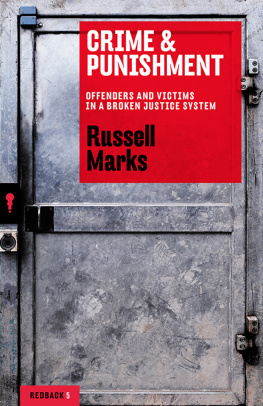
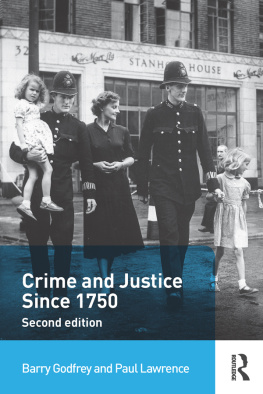
![Laura L. Finley - Crime and Punishment in America: An Encyclopedia of Trends and Controversies in the Justice System [2 Volumes]](/uploads/posts/book/305562/thumbs/laura-l-finley-crime-and-punishment-in-america.jpg)
